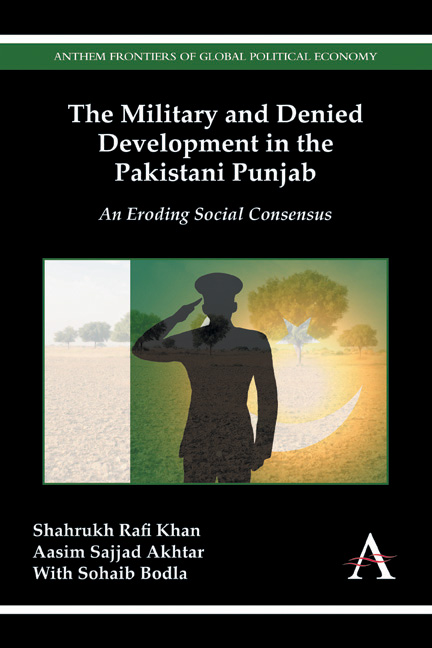Book contents
- Frontmatter
- Dedication
- CONTENTS
- Acknowledgments
- Abbreviations
- Preface
- Chapter One The Military and Economic Development in Pakistan
- Chapter Two Punjab's State–Society Consensus on the Military's Dominance and Economic Role
- Chapter Three Research Design, Method, Institutional Issues and Scope of the Military's Land Acquisitions
- Chapter Four The Military's Agrarian Land Acquisitions: High Handedness and Social Resentment
- Chapter Five From Social Resentment to Social Resistance
- Chapter Six Bahria Town: A Military-Related Real Estate Venture
- Chapter Seven The Military as Landlord in the Pakistani Punjab: Case Study of the Okara Farms
- Chapter Eight Guardians No More? The Breakdown of the Consensus
- Glossary
- Index
Chapter Two - Punjab's State–Society Consensus on the Military's Dominance and Economic Role
Published online by Cambridge University Press: 05 December 2014
- Frontmatter
- Dedication
- CONTENTS
- Acknowledgments
- Abbreviations
- Preface
- Chapter One The Military and Economic Development in Pakistan
- Chapter Two Punjab's State–Society Consensus on the Military's Dominance and Economic Role
- Chapter Three Research Design, Method, Institutional Issues and Scope of the Military's Land Acquisitions
- Chapter Four The Military's Agrarian Land Acquisitions: High Handedness and Social Resentment
- Chapter Five From Social Resentment to Social Resistance
- Chapter Six Bahria Town: A Military-Related Real Estate Venture
- Chapter Seven The Military as Landlord in the Pakistani Punjab: Case Study of the Okara Farms
- Chapter Eight Guardians No More? The Breakdown of the Consensus
- Glossary
- Index
Summary
Introduction
While the Pakistani military's economic empire has unquestionably been built on the back of the institution's coercive power, one of the central premises of this book is that the military's political and economic preeminence has been sustained by a critical mass of support from within Punjabi society. In this chapter we briefly explore the unique colonial social contract forged in what is today's Pakistani Punjab and discuss the various factors that reinforced this social contract in the postcolonial period. Subsequently, we argue that the military's insatiable appetite to expand its economic empire is unveiling contradictions within Punjabi society that were previously latent. There are signs that the state–society consensus – both cause and consequence of the military's dominance and economic role – has started to break down. Finally, we draw on our historical overview to discuss state theory in Pakistan to explore the military's power as a function of both its coercive power and consent generated from below.
Punjabi State–Society Relations in the Colonial Period
Punjab is, in every sense, Pakistan's heartland. It is the country's most populous, economically rich and politically influential province. It is also predominantly the home of the Pakistani military. The majority of the military's recruits hail from the Punjab, while cantonments are spread out across the length and breadth of the province. Including paramilitary forces and reserves, the Pakistani military was about 1.4 million strong in 2010, which means that substantial economic and political benefits are garnered by a sizeable proportion of Punjab's labor force through its affiliation with the military, both direct and indirect. Only a century ago, however, Punjab's demographic, economic and political landscapes were very different. While its eastern regions were better populated, what is today Pakistani Punjab featured substantial nomadic populations and scattered settled areas. The flow of Punjab's five rivers dictated agrarian settlement and it was not until the British undertook their epic canal irrigation revolution that the foundations of modern Punjabi society were laid.
- Type
- Chapter
- Information
- The Military and Denied Development in the Pakistani PunjabAn Eroding Social Consensus, pp. 23 - 42Publisher: Anthem PressPrint publication year: 2014

